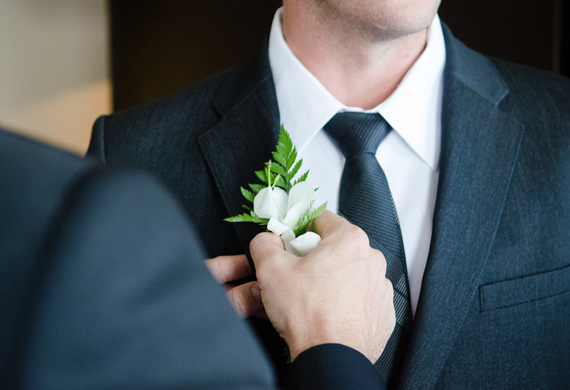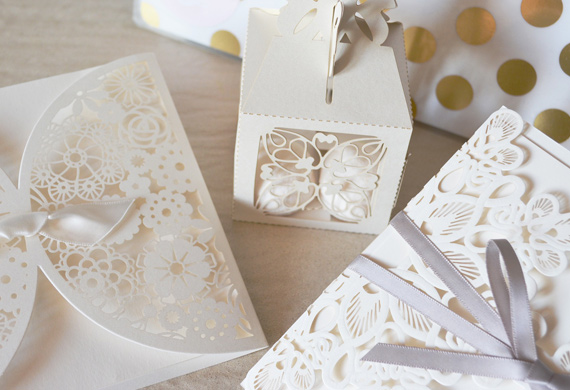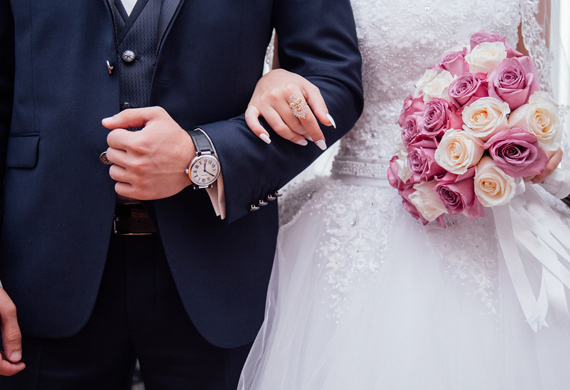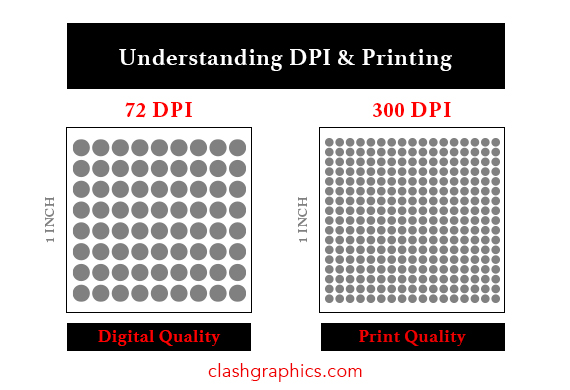How Do I Plan My Wedding?
Posted by Clash Graphics on 14th Jan 2019
“I’m engaged! What now?” Don’t let the event of your dreams become a nightmare of epic proportions. Discover what it takes to pull off a well organized once in a lifetime celebration.

Planning a flawless wedding ceremony requires you to be organized, know your budget, and follow a timeline with strict deadlines. Using the checklist below will help you maintain your schedule as the big day approaches.
clashgraphics.com provides below a 16-month timeline with expert wedding planning advice and tips. This will assist you in navigating your way from engagement, to after-party, and creating the perfect wedding day celebration.
Wedding Planning Checklist
Using a checklist will keep things from getting out of control. A wedding, like any other major event, should be organized well enough in advance to get things done in a logical order.
Typical wedding engagements last approximately 16 months. That said, the following checklist can be extended or shortened to meet your specific time requirements.
Wedding Planning 13 to 16 Months Before
Start a Wedding Book - Get a 2in 3-ring binder, dividers, and a hole-punch. This is where you will keep ideas, pictures, and clippings to serve as inspiration in the coming months.

This book will also serve as a place for your checklist, vendor contact information, order confirmations, and receipts.
Wedding Party Selection - When assembling your wedding party, consider the people that will be by your side for the rest of your life. Start with your siblings and childhood friends.
As you approach your wedding date, these are the people you will rely on to help you keep everything on track.
The Guest List - One of the greatest influences on your wedding budget will be your guest list (practically half of the budget). While you may want to invite everyone you know and have ever met, the reality is that you will have to be practical and decisive with the number of guests attending your wedding.
Create a digital spreadsheet to keep track of who’s who, their contact information, and whether or not they RSVP.
Tip: Assign everyone on the guest list a tier number ranging from 1 to 3. In the event you must reduce the number of guests at your wedding, you can use this as a guide. If the time comes to make this difficult decision of who to cut from the list, start with the 3’s and work your way up until you reach the target number of guests.
If cuts are to be made, they should be made BEFORE sending out invitations. It is not wise to “un-invite” people after inviting them.
Figure Out Your Budget - Between the money you have, family contributions, and the amount of credit you plan to use, establish your budget for the entire wedding event.
Wedding Planning 9 to 13 Months Before
Book an Officiant - Your wedding officiant is the person who will lead your wedding ceremony. They must be legally recognized to do so in the state where your wedding takes place. In a religious ceremony, your officiant must be qualified in the eyes of that religion as well.
Choose the Date - When choosing your wedding date, take into account holidays, school breaks, the season and typical weather pattern. Also, avoid picking a date too close or that overlaps another wedding.
Reserve the Venue - Once you have determined a date and evaluated several venues, it is time to choose and reserve the venue.
Research Caterers, Florists, Bands, and Photographers - As you research these vendors, keep their contact information, pricing, packages, and promotions in your binder for quick reference.
Wedding Planning 8 Months Before
Buy Your Dress - Be prepared to schedule a series of fittings. When going to the fittings, have the shoes you will wear at your wedding so the dress’s length can be accurately adjusted.

Your Groom’s Tuxedo - It’s also time for your groom to select the color and style of his tuxedo, buy it, and get fitted for it.
Hire the Photographer - Hire the photographer and videographer that you are most comfortable with based on their previous work, online ratings, and recommendations.
Book the Band - (and other entertainment) Whether you are looking for a band, DJ, or both, make sure they are available for your wedding date and book them now.
Tip: Before hiring any type of entertainment, take the time to go see them in person and online. Pay particular attention to the way they interact with the crowd and the crowd’s reaction to them.
Meet With Caterers - If you choose a venue that does not have its own catering, you should be hiring one within the next 30 days.
Save the Date - Send out “Save the Date” invitations.
Wedding Planning 6 to 7 Months Before
Out-of-Town Guests - Reserve a block of hotel rooms in a reasonably priced hotel near your wedding venue for those guests and members of the wedding party that are traveling. Some hotels may even offer special rates for events like yours.
Tip: Before reserving the rooms, confirm the hotel’s cancellation policy and required advance notice. You don’t want to pay for rooms you cannot fill.
Create a Wedding Website - Sites like WeddingWire, clashweb.com, and the knot, allow you to build and launch a website that allows your friends and family to follow the progress of and receive information about your wedding preparations.
Hire a Stationer or Print Shop - For your invitations, an expert stationer or experienced print shop can be your guide. With their help, you can to come up with personalized wedding invitations.
Tip: Don’t forget to include an “RSVP by” date - which is usually 4 to 5 weeks before the wedding date.
Dresses for Bridesmaids - Shop for these dresses now. You should allow at least 6 months for the dresses to be ordered and fitted.
Suits for the Groomsmen - Your groom should be shopping for the groomsmen’s suits at this time.

Hold a Meeting with Your Officiant - In this meeting, you will go over the ceremony details and confirm that you have all of the necessary documentation.
States, counties, and religions may require different sets of documentation. Your wedding officiant will help you meet these requirements.
Book Your Florist - Now that the palette of your wedding is becoming clear, it is safe to plan the flower arrangements. Booking at this time also gives your florist enough advance notice to attend to any special floral requests.
The Wedding Day Timeline - Create a “playbook” of your wedding day which includes arrival times, ceremony time, cake-cutting time, etc.
By planning this far in advance, you will be able to make subtle or drastic changes with ease, if needed.
Book Your Transportation - It’s time to decide how you will shuttle people from one location to the other, including your arrival and final departure.
Tip: When considering low to the ground vehicles like limos, keep in mind that these vehicles and fitted dresses can be a challenging pair when entering or exiting them.
Plan Your Honeymoon - Whether you are planning for a domestic or international honeymoon, seek the assistance of a travel agent. Let them worry about all the significant details of your trip.

Tip: Planning this far out will allow you to make certain that your passports are up to date, that you have acquired the proper visas, and to get any recommended immunizations depending on the country or countries you plan to visit.
Wedding Planning 5 Months Before
Verify the Wedding Invitations - Request samples of the finished product to either approve or make any changes to them.
The Cake - With the wedding palette and floral arrangements in mind, book several tastings with various bakers. Once you’ve decided which baker to use, work with them on the design and order the cake.
Book the Venues for Rehearsals - Now is the time to book venues for the wedding and dinner rehearsals. Be ready to negotiate the cost of the venue and the menu.
Once the venues are booked, provide your stationer or print shop with the information and have them produce rehearsal invitations.
Wedding Dress Fitting 1 - Schedule your first fitting. Remember to take the shoes with you.
Wedding Planning 3 to 4 Months Before
Mail the Invitations - Twelve to sixteen weeks is the timeframe needed for most people to adjust their schedules and make travel arrangements.

Hair and Makeup - Schedule several professionals to do your hair and makeup before you settle on one.
Tip: Take pictures and short videos to compare their results. Once you’ve made a determination, book them immediately.
The Music Lineup - You are in control of the music. Determine which style of music should be playing before and during the wedding party announcement, reception, dinner, and during the dance.
Confirm Flowers and Menu - Availability of certain foods and flowers are determined by season. This is the time to revisit both and confirm that the vendors can deliver what you have requested. Be mindful of and include guests’ dietary restrictions.
Readings and Toasts - Determine what will be read at the ceremony and by whom. Likewise, now is the time to decide who and in what order they will toast you at the reception. Careful with your selection, toasts can quickly become roasts!
Order of Events - Now is the time to finalize the order of events during the ceremony and reception.
Menus and Programs - Now that you have a solid concept of your menu and the order of events, consult your stationer or print shop to produce menus and programs following the design of the invitations.
Wedding Dress Fitting 2 - Schedule your second fitting. This time take the undergarments you plan to use along with the shoes.
Rings - Purchase the rings now. This allows time for sizing and engraving.

Wedding Planning 2 Months Before
Vendors - Send your event schedule to your vendors at the beginning of the month. This will allow enough time for them to adjust to the schedule and offer any feedback that will help you avoid any last minute surprises.
The Photographer - Schedule a meeting with your photographer to determine which shots you want and the specific locations in the venue you wish to use as a backdrop. You can also determine the location and plan for the videographer.
Meet the Band - Whether you’ve booked a band or a DJ, now is the time to meet with them and go over the music that must be played for certain dances and moments. While you probably cannot dictate all of the songs to be played or performed, you can definitely decide the genres and the tone.
Wedding Announcement - Submit a wedding announcement to your local newspaper.
Vendors (Again) - At the end of the month, contact your vendors once more to ensure that any questions they have about your event and scheduling are answered.
Wedding Planning 1 Month Before
Rehearsal Invitations - Mail out your rehearsal invitations.
Guest RSVP - As your guests RSVP for the wedding, check them off on your spreadsheet. For those who have not confirmed, contact them.
Food and Drink - Once you pass the RSVP deadline, you now have a solid headcount to work with. Order the food and drinks accordingly.

Seating Arrangements - Go over the guest list with your fiancée to determine who will sit where.
Wedding Dress Fitting 3 - Schedule your last fitting 2 weeks before the wedding. Scheduling it this close to the wedding will help you avoid any undesired surprises and ensure a perfectly fitted dress.

Arrival Times - Confirm arrival times with all of your vendors.
Confirm Your Appointment - Confirm the time for your hair and makeup appointment. Don’t forget to make an appointment for a manicure and pedicure as well (the day before the wedding).
The Week Of The Wedding
Delegate Small Tasks - With so much going on, you can delegate tasks to your most trusted people. This will help you avoid losing control.
Vendors - Take the time to confirm their arrival times once more. Better safe than sorry.
Bridal Party - Send them a wedding day timeline which includes all of their contact info and which tasks were delegated to whom.
The Dresses - Pick up your dress or have it delivered. As for the bridesmaids, ensure that they have theirs as well.
The Tuxedo - Your groom should be getting his tuxedo, as well as confirming that his groomsmen have their suits.
Payments - Make as many final payments as possible, and set aside checks or schedule payments for your vendors on the day of the wedding.
Final Guest List - Send your final guest list to your venue and caterers. Include any guest’s dietary restrictions.
Pack Your Bags - You are packing one set of bags for your wedding day to take to the venue, and another set of bags for your honeymoon.
Your Wedding Day
Arrive at the venue or dressing area early enough to avoid pressure or stress while getting ready, and now it’s time to breathe and enjoy yourself on this magical day.

Your Perfect Wedding Ceremony
Avoid confusion and tattered nerves as you approach your wedding day. Using the checklist above, you will be able to set target dates and tasks for a flawlessly executed event.
This article presented you with a comprehensive 16-month timeline including expert wedding planning advice to help you organize yourself, your wedding party, and your tasks. In this article, you also discovered when to book your venue, vendors, and when to confirm their services.
An event such as this requires you to be decisive and laser-focused to meet specific deadlines as your wedding day gets closer. Without this level of organization, the day of your dreams could potentially turn into a nightmare of confusion, late deliveries, and embarrassment.
Sources:
https://ids.uni.edu/happilyeverafter
https://www.bvu.edu
Clash Graphics Print Shop Atlanta Flyer Printing
2233 Peachtree Rd NE Ste 202 Atlanta, GA 30309
(678) 235-3464






